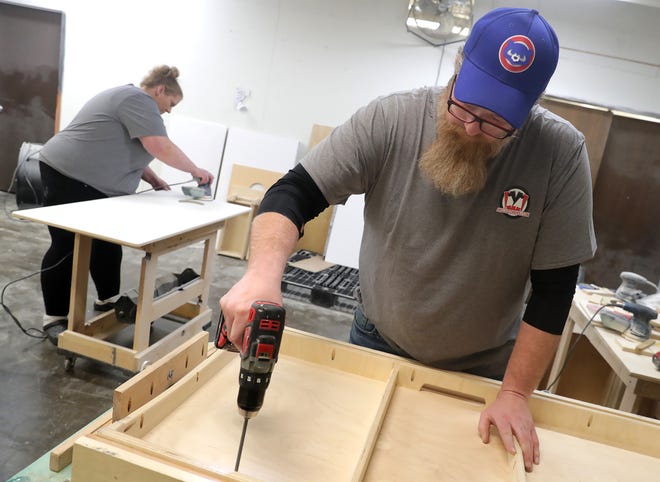Meet the dad, mom, daughter and son-in-law who run a custom cornhole business together in Appleton
 Becky Jacobs
Becky Jacobs
APPLETON — Howie Wood served in the Army. He's farmed and shoed horses. And he's always been pretty creative.
So, one day, when he saw a cornhole board, Wood thought to himself, “I can make one of those.”
The hobby — and dust — soon took over the house, as Howard, 88, and his wife, Nancy Wood, 81, put together boards in their garage and kitchen, trying to keep up with the demand from interested people.
“Next thing you know," he said, "we kept selling more and more and more."
That was about eight years ago. Today, the "retired" couple run the business, Skilled Cornhole, out of an Appleton building at 1500 Rogers Ave. with their daughter and son-in-law, Stephanie and Tony Bishell, both 41.
It's truly a family-owned business. Not only do they work together — Stephanie does the designing, Tony handles production, Nancy manages the books and Howie makes the bags — but the four of them also live together in Appleton. Even Stephanie's brother, Scott Wood, previously helped out.
None of them thought, though, they'd wind up making handcrafted, custom cornhole boards — "not in the least," said Stephanie.
"But honestly, we love it, and we're excited about where it can go."

The game shapes the business
The Woods and Bishells make the cornhole boards and bags in the Rogers Avenue building, complete with a showroom where customers can view and try out products. They also let people practice there for free, especially during the winter months when it's too cold to play outdoors.
Every board has been fun to create, in its own way, Stephanie said. People want pictures of their kids or pets, or they ask for sets for birthdays, anniversaries and company events, according to Nancy. They've made boards for weddings, Howie said, where guests sign them at the ceremony and reception, and then Skilled Cornhole puts the finish on after.
While there have been late nights to fulfill orders in time, it's fun to see customers' reactions when they come to pick up the finished product, Stephanie said.

Skilled Cornhole sells to people across the Midwest and the broader U.S. The materials and features they use have evolved, as the family followed the trends of the game. There are special types of resin that can make a bag fall faster, according to Howie. Players may also want a bag with a carpet material on one side, which he said can help it roll over a competitor's bag that's blocking the hole.
“It’s getting quite technical,” Stephanie said, especially among younger generations looking to perfect trick shots.
There are also competitive, professional players, throwing five or six nights a week to get better.
“Then," Stephanie said, "you have your backyard players, who are just out to have a great time."
Owners notice growing popularity
Similar to pickleball, cornhole has recently grown in popularity. Part of the appeal, Nancy explained, is "everybody can play it.”
"It's a really versatile game," Stephanie said, that attracts people of all ages. No matter who you are, she said, the game is about having fun.
Nancy said they have a lot of customers who are campers and buy boards for tournaments at campgrounds. Area bars host games, Howie said, as well as as bowling alleys and the American Legion.
Even a year and a half ago, people seemed unsure about starting a league, Stephanie said.
"'Cornhole? Who’s going do that? No, I’m not spending that much on a board,'" Stephanie said they told her. "Now they're calling us going, ‘We need 10 boards, and we're starting a league.’”

Bags are key, no matter what you call the game
Some people call the game "bags"; others refer to it as "cornhole." The term can vary depending on where you live, Tony said. But the official term is "cornhole," according to Howie.
“I've had some people actually yell at me and tell me I was dirty minded because I called it 'cornhole,'" Stephanie said. "I was like, I didn’t name it. You put a bag of corn in a hole. Get your head out of the gutter."
Whatever you call it, "the bags are a big thing,” Howie said. When they started the business, they used duck cloth and corn, but corn can get really dusty. So, Howie said, they switched to wheat. Now, everybody uses resin.
Eight duck cloth bags can cost $30, according to Howie. Meanwhile, to get the American Cornhole League stamp, those might run about $120 for four bags, he said.
For some, it's a collecting thing. One woman who recently stopped in at Skilled Cornhole had 130 sets of bags, Howie said.

Skilled Cornhole grateful for community that's helped them grow
As the business and cornhole's popularity continue to grow, Stephanie said they're preparing to keep up. That means new marketing strategies and expanding the retail business and accessories.
“We’ve been very lucky," she said, to have a community of friends, family and customers who've supported them.
The business provides a personal touch, Stephanie said, and they do everything possible to bring a customer's idea to life.
"Plus," she said, "everybody loves mom and dad," and they know they can stop in to chat.
Stephanie said they are not only excited to see what the business holds for their own family in the future, but what they can do for others.
"We're just looking forward to being able to expand and grow and enjoy it, meet new people," she said. "I love that part of it.”
Reach Becky Jacobs at bjacobs@gannett.com or 920-993-7117. Follow her on Twitter at @ruthyjacobs.